Thomas James Richards, Diaries, Transcript Vol. 3, 26 January to 8 November 1916 - Part 9
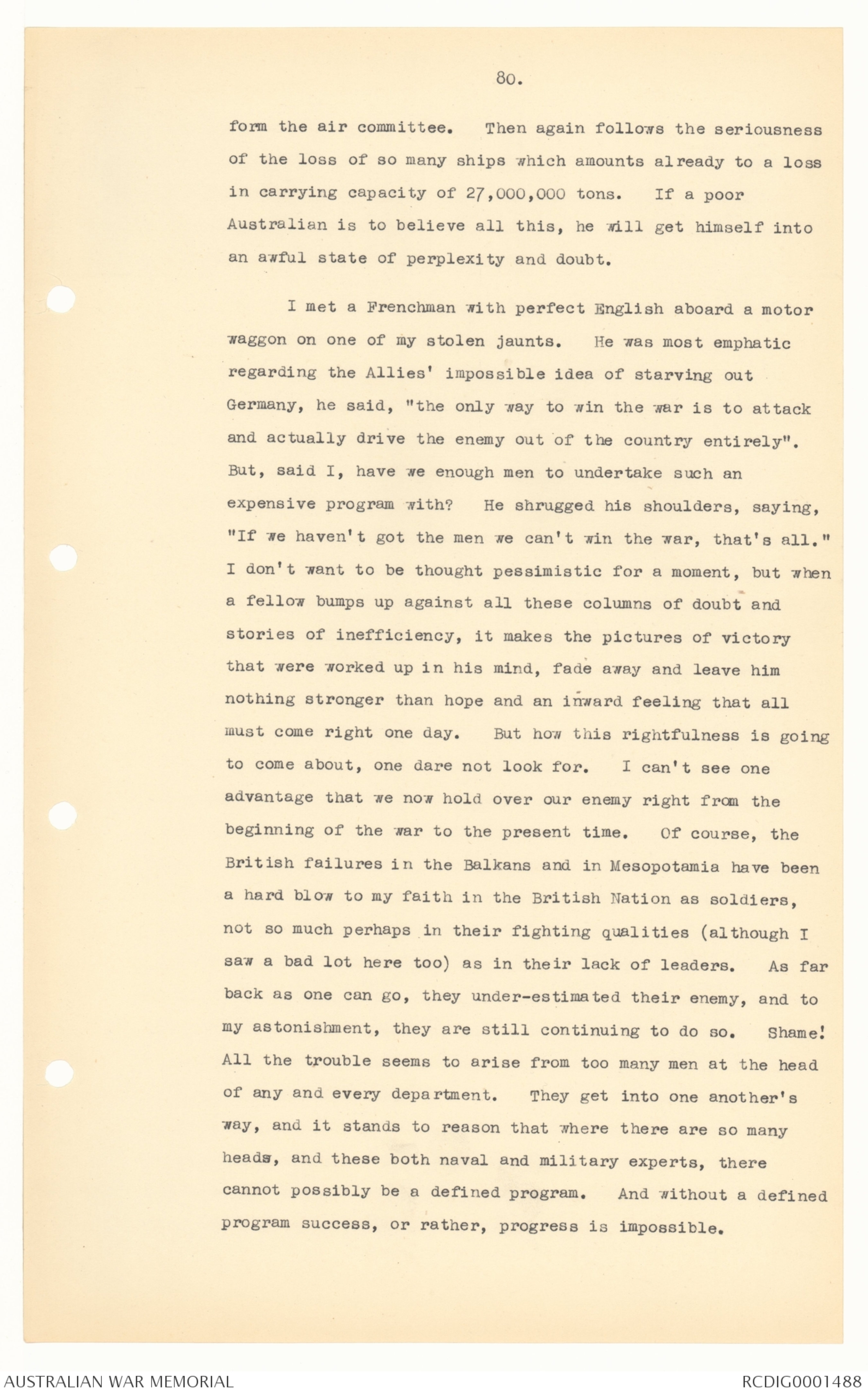
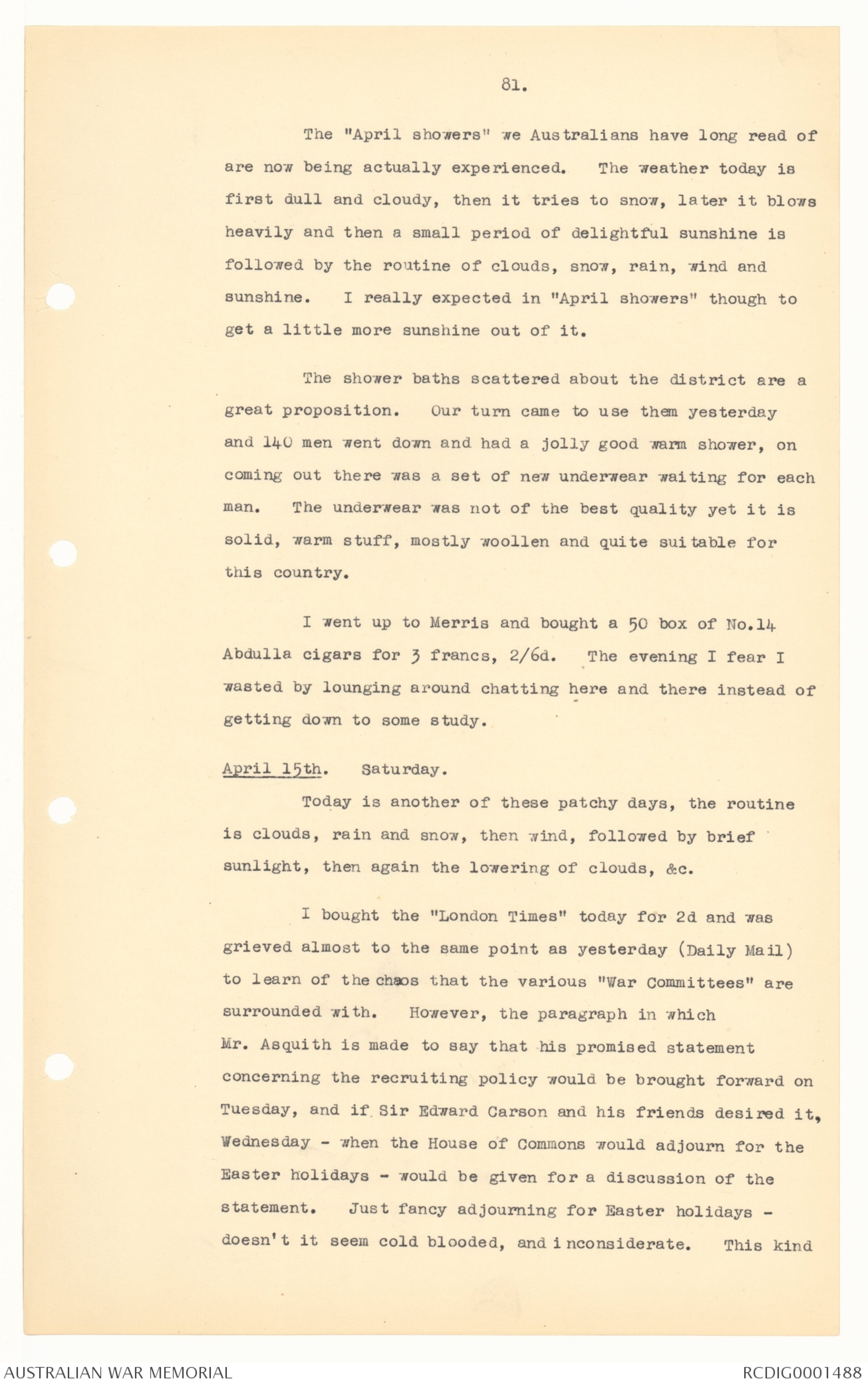
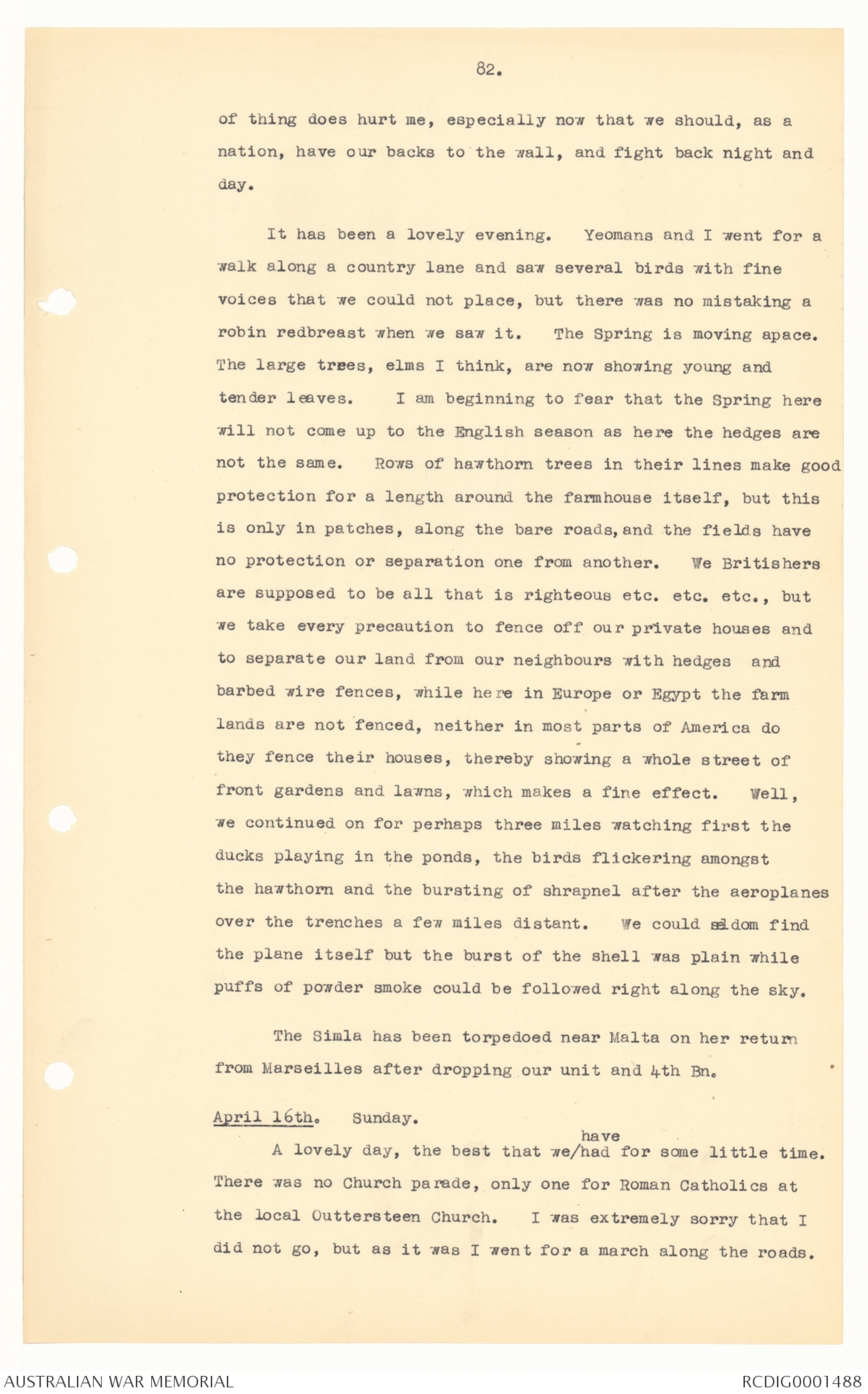
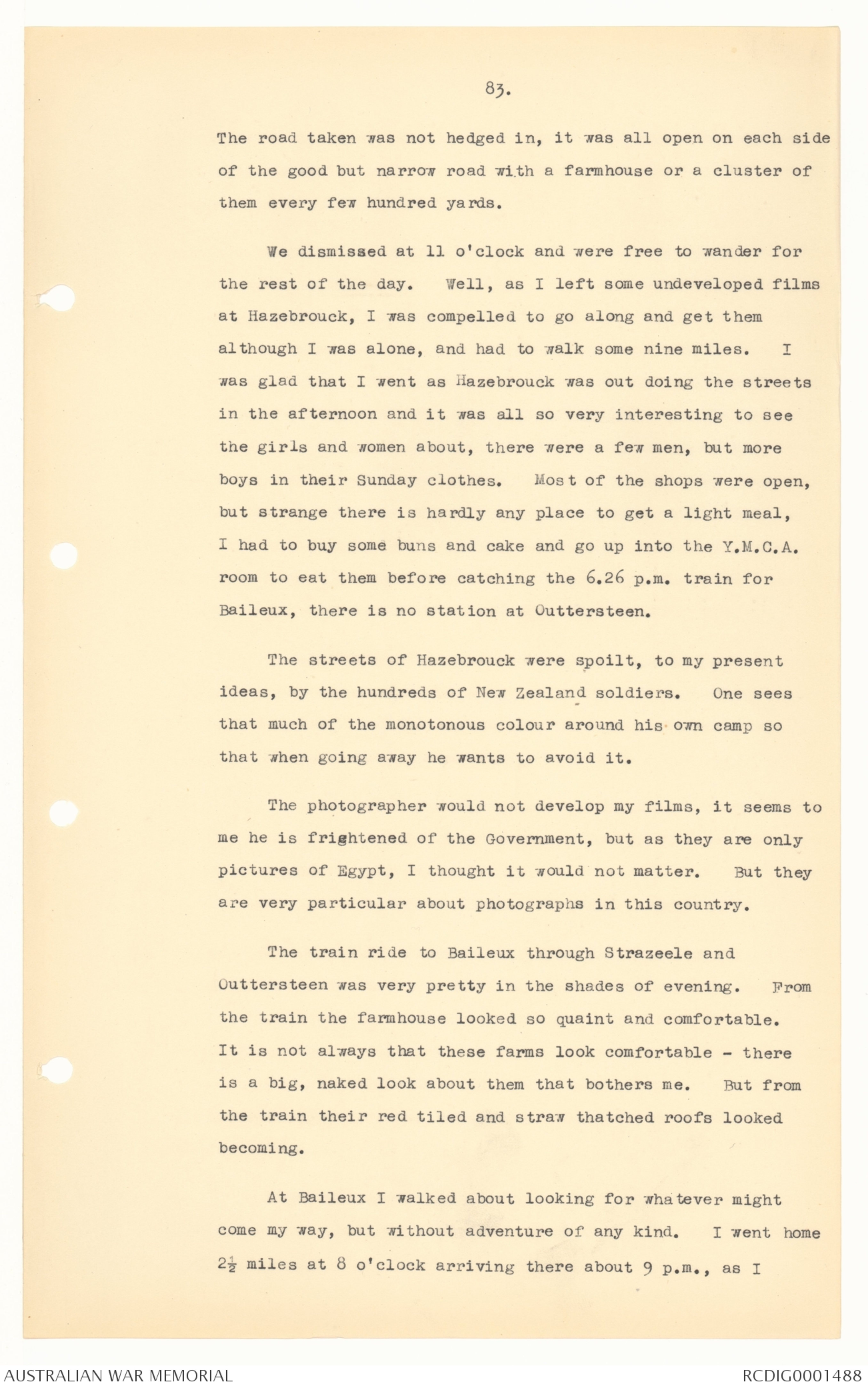
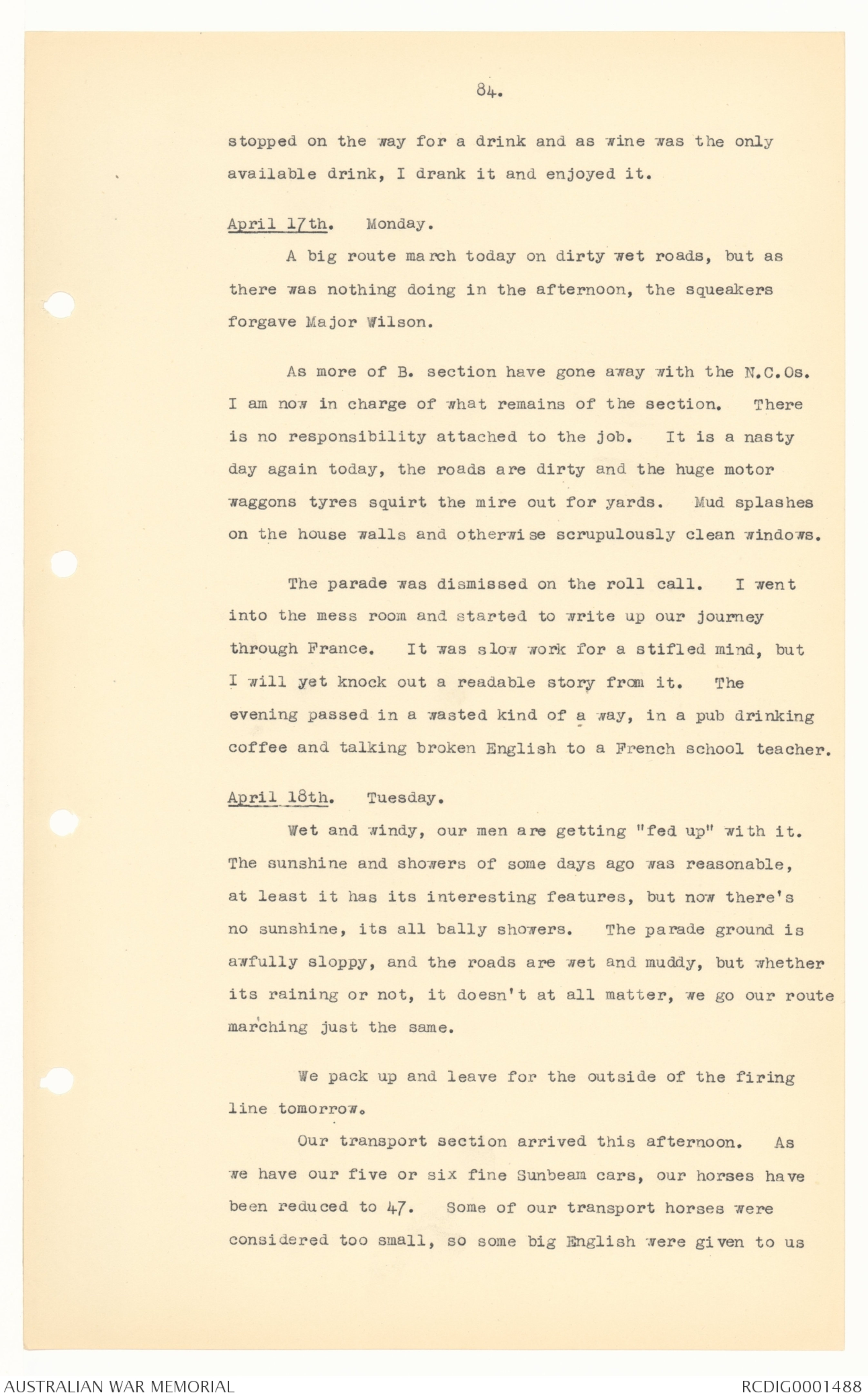
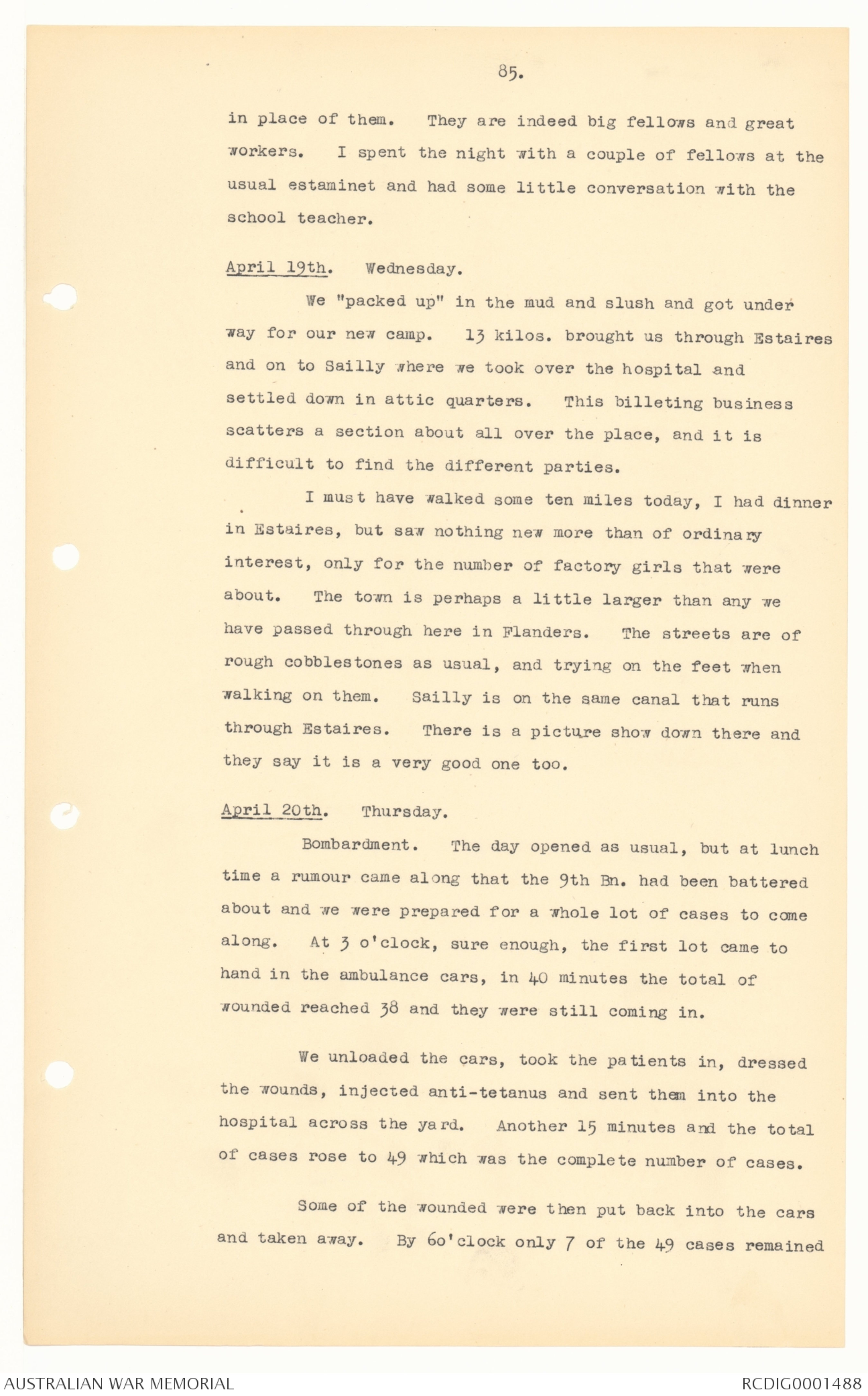
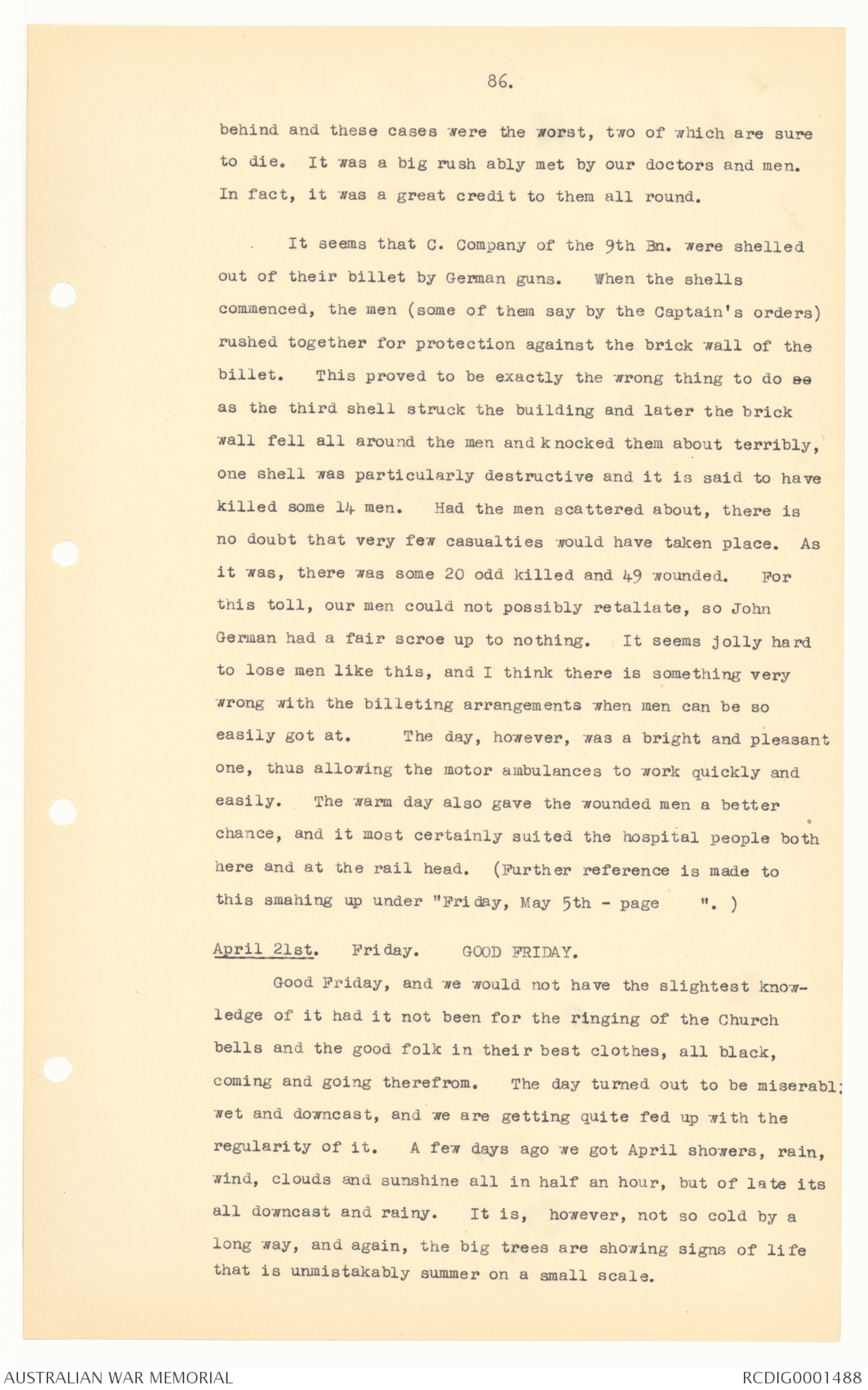
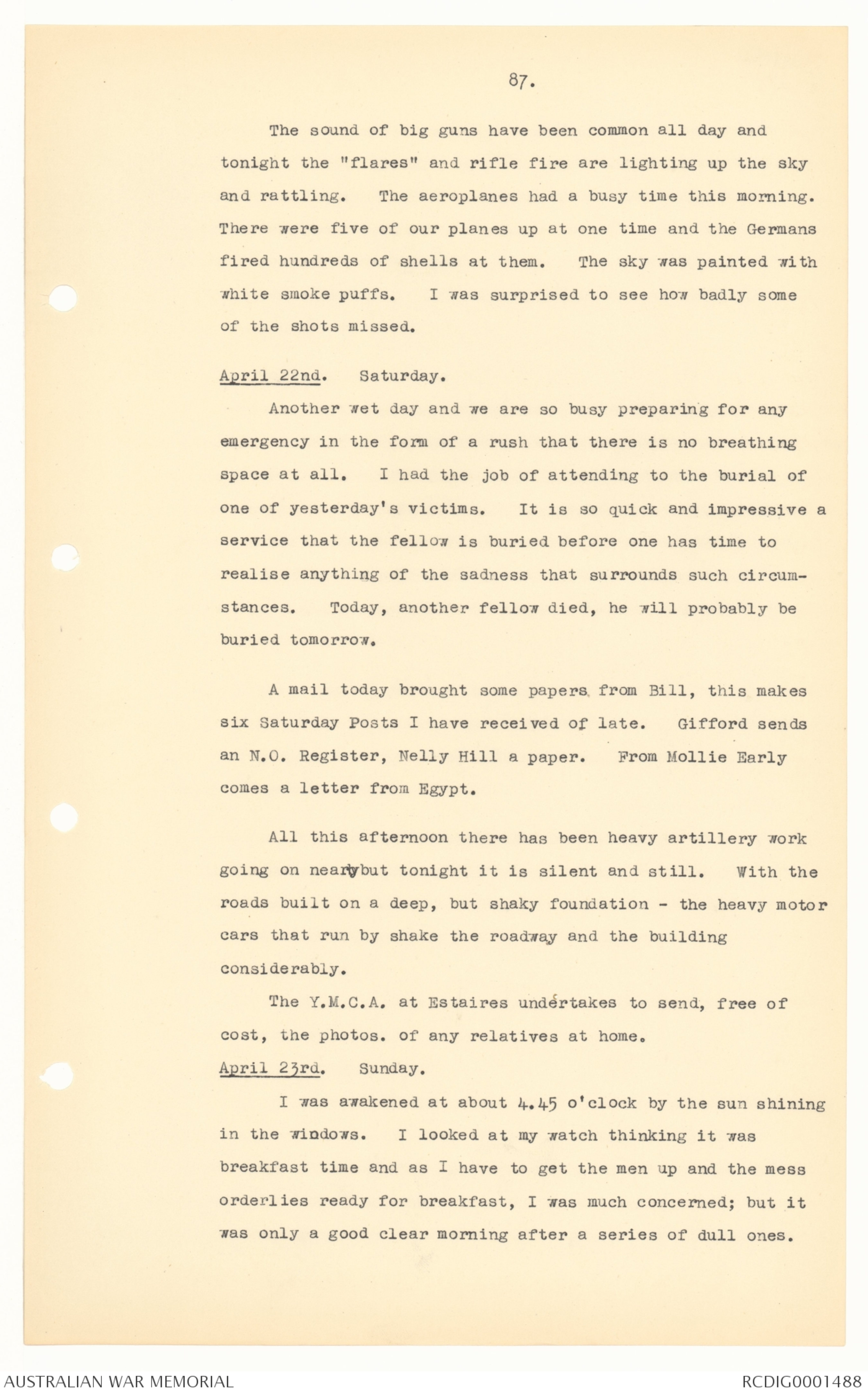
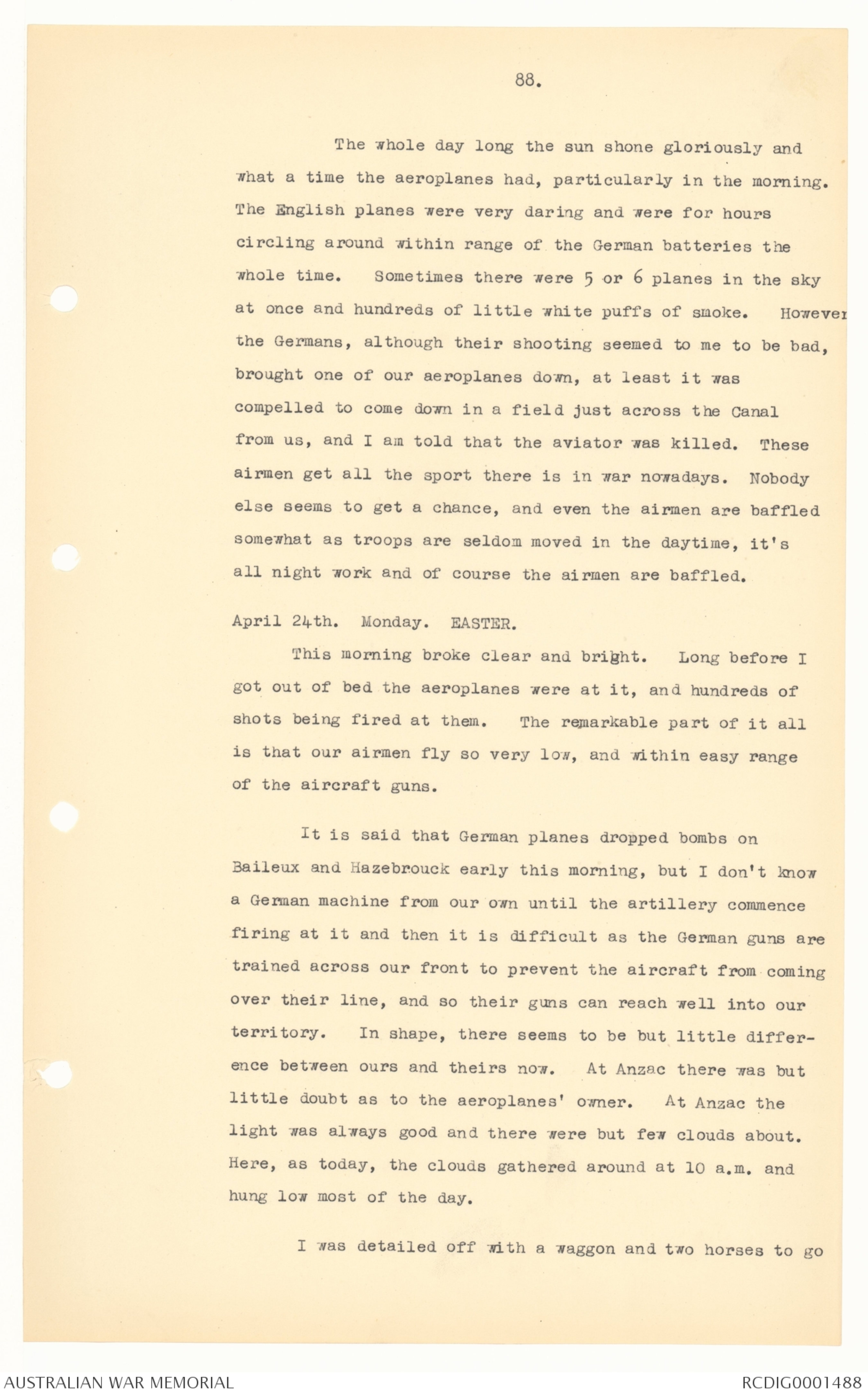
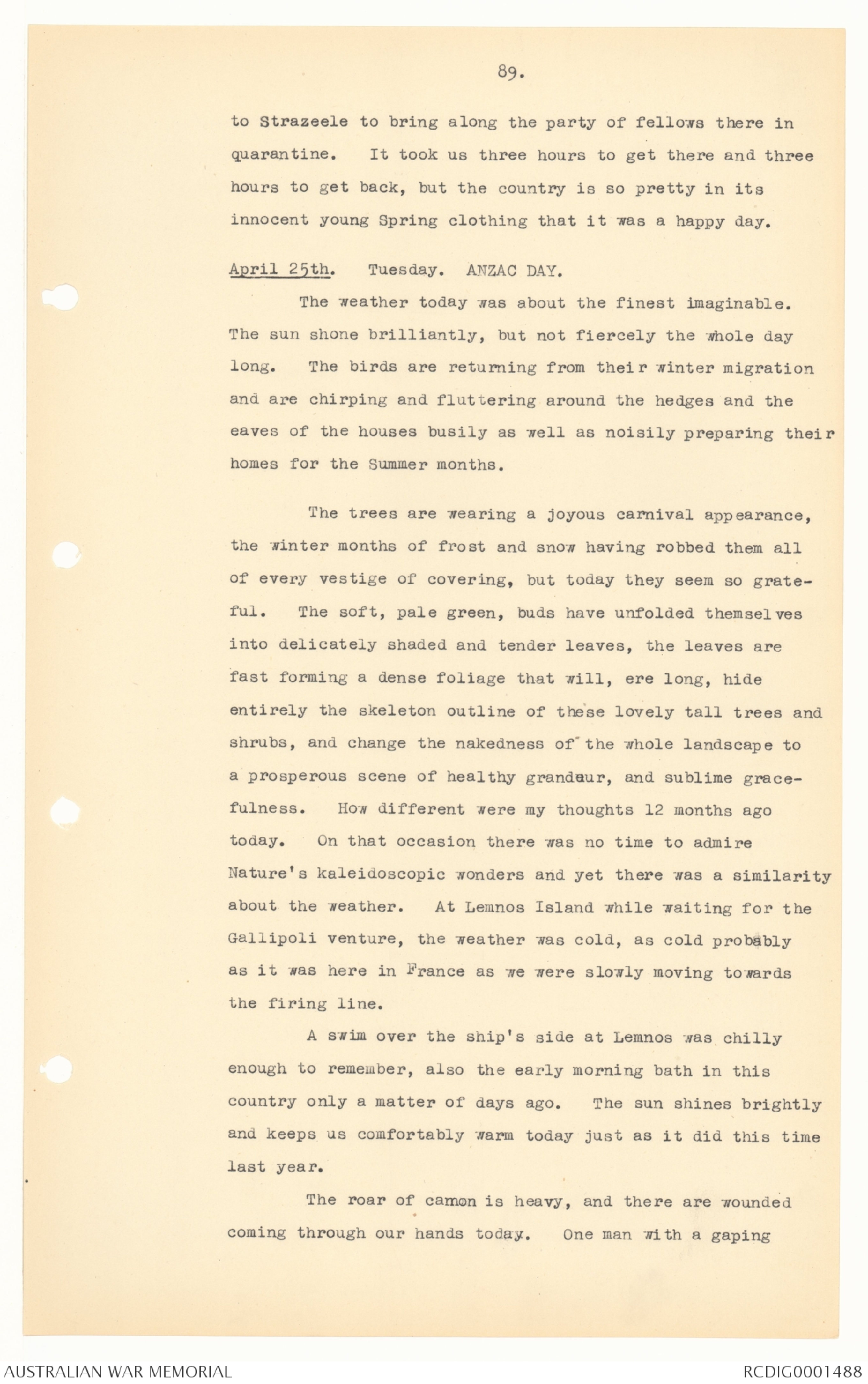
80.
form the air committee. Then again follows the seriousness
of the loss of so many ships which amounts already to a loss
in carrying capacity of 27,000,000 tons. If a poor
Australian is to believe all this, he will get himself into
an awful state of perplexity and doubt.
I met a Frenchman with perfect English aboard a motor
waggon on one of my stolen jaunts. He was most emphatic
regarding the Allies' impossible idea of starving out
Germany, he said, "the only way to win the war is to attack
and actually drive the enemy out of the country entirely".
But, said I, have we enough men to undertake such an
expensive program with? He shrugged his shoulders, saying,
"If we haven't got the men we can't win the war, that's all.
I don't want to be thought pessimistic for a moment, but when
a fellow bumps up against all these columns of doubt and
stories of inefficiency, it makes the pictures of victory
that were worked up in his mind, fade away and leave him
nothing stronger than hope and an inward feeling that all
must come right one day. But how this rightfulness is going
to come about, one dare not look for. I can't see one
advantage that we now hold over our enemy right from the
beginning of the war to the present time. Of course, the
British failures in the Balkans and in Mesopotamia have been
a hard blow to my faith in the British Nation as soldiers,
not so much perhaps in their fighting qualities (although I
saw a bad lot here too) as in their lack of leaders. As far
back as one can go, they under-estimated their enemy, and to
my astonishment, they are still continuing to do so. Shame!
All the trouble seems to arise from too many men at the head
of any and every department. They get into one another's
way, and it stands to reason that where there are so many
heads, and these both naval and military experts, there
cannot possibly be a defined program. And without a defined
program success, or rather, progress is impossible.
81.
The "April showers" we Australians have long read of
are now being actually experienced. The weather today is
first dull and cloudy, then it tries to snow, later it blows
heavily and then a small period of delightful sunshine is
followed by the routine of clouds, snow, rain, wind and
sunshine. I really expected in "April showers" though to
get a little more sunshine out of it.
The shower baths scattered about the district are a
great proposition. Our turn came to use them yesterday
and 140 men went down and had a jolly good warm shower, on
coming out there was a set of new underwear waiting for each
man. The underwear was not of the best quality yet it is
solid, warm stuff, mostly woollen and quite suitable for
this country.
I went up to Merris and bought a 50 box of No.14
Abdulla cigars for 3 francs, 2/6d. The evening I fear I
wasted by lounging around chatting here and there instead of
getting down to some study.
April 15th. Saturday.
Today is another of these patchy days, the routine
is clouds, rain and snow, then wind, followed by brief
sunlight, then again the lowering of clouds, &c.
I bought the "London Times" today for 2d and was
grieved almost to the same point as yesterday (Daily Mail)
to learn of the chaos that the various "War Committees" are
surrounded with. However, the paragraph in which
Mr. Asquith is made to say that his promised statement
concerning the recruiting policy would be brought forward on
Tuesday, and if Sir Edward Carson and his friends desired it,
Wednesday - when the House of Commons would adjourn for the
Easter holidays - would be given for a discussion of the
statement. Just fancy adjourning for Easter holidays -
doesn't it seem cold blooded, and inconsiderate. This kind
82.
of thing does hurt me, especially now that we should, as a
nation, have our backs to the wall, and fight back night and
day.
It has been a lovely evening. Yeomans and I went for a
walk along a country lane and saw several birds with fine
voices that we could not place, but there was no mistaking a
robin redbreast when we saw it. The Spring is moving apace.
The large trees, elms I think, are now showing young and
tender leaves. I am beginning to fear that the Spring here
will not come up to the English season as here the hedges are
not the same. Rows of hawthorn trees in their lines make good
protection for a length around the farmhouse itself, but this
is only in patches, along the bare roads,and the fields have
no protection or separation one from another. We Britishers
are supposed to be all that is righteous etc. etc. etc., but
we take every precaution to fence off our private houses and
to separate our land from our neighbours with hedges and
barbed wire fences, while here in Europe or Egypt the farm
lands are not fenced, neither in most parts of America do
they fence their houses, thereby showing a whole street of
front gardens and lawns, which makes a fine effect. Well,
we continued on for perhaps three miles watching first the
ducks playing in the ponds, the birds flickering amongst
the hawthorn and the bursting of shrapnel after the aeroplanes
over the trenches a few miles distant. We could seldom find
the plane itself but the burst of the shell was plain while
puffs of powder smoke could be followed right along the sky.
The Simla has been torpedoed near Malta on her return
from Marseilles after dropping our unit and 4th Bn.
April 16th. Sunday.
A lovely day, the best that we/ have had for some little time
There was no Church parade, only one for Roman Catholics at
the local Outtersteen Church. I was extremely sorry that I
did not go, but as it was I went for a march along the roads.
83.
The road taken was not hedged in, it was all open on each side
of the good but narrow road with a farmhouse or a cluster of
them every few hundred yards.
We dismissed at 11 o'clock and were free to wander for
the rest of the day. Well, as I left some undeveloped films
at Hazebrouck, I was compelled to go along and get them
although I was alone, and had to walk some nine miles.
I was glad that I went as Hazebrouck was out doing the streets
in the afternoon and it was all so very interesting to see
the girls and women about, there were a few men, but more
boys in their Sunday clothes. Most of the shops were open,
but strange there is hardly any place to get a light meal,
I had to buy some buns and cake and go up into the Y.M.C.A.
room to eat them before catching the 6.26 p.m. train for
Baileux, there is no station at Outtersteen.
The streets of Hazebrouck were spoilt, to my present
ideas, by the hundreds of New Zealand soldiers. One sees
that much of the monotonous colour around his own camp so
that when going away he wants to avoid it.
The photographer would not develop my films, it seems to
me he is frightened of the Government, but as they are only
pictures of Egypt, I thought it would not matter. But they
are very particular about photographs in this country.
The train ride to Baileux through Strazeele and
Outtersteen was very pretty in the shades of evening. From
the train the farmhouse looked so quaint and comfortable.
It is not always that these farms look comfortable - there
is a big, naked look about them that bothers me. But from
the train their red tiled and straw thatched roofs looked
becoming.
At Baileux I walked about looking for whatever might
come my way, but without adventure of any kind. I went home
2½ miles at 8 o'clock arriving there about 9 p.m., as I
84.
stopped on the way for a drink and as wine was the only
available drink, I drank it and enjoyed it.
April 17th. Monday.
A big route march today on dirty wet roads, but as
there was nothing doing in the afternoon, the squeakers
forgave Major Wilson.
As more of B. section have gone away with the N.C.Os.
I am now in charge of what remains of the section. There
is no responsibility attached to the job. It is a nasty
day again today, the roads are dirty and the huge motor
waggons tyres squirt the mire out for yards. Mud splashes
on the house walls and otherwise scrupulously clean windows.
The parade was dismissed on the roll call. I went
into the mess room and started to write up our journey
through France. It was slow work for a stifled mind, but
I will yet knock out a readable story from it. The
evening passed in a wasted kind of a way, in a pub drinking
coffee and talking broken English to a French school teacher.
April 18th. Tuesday.
Wet and windy, our men are getting "fed up" with it.
The sunshine and showers of some days ago was reasonable,
at least it has its interesting features, but now there's
no sunshine, its all bally showers.
The parade ground is awfully sloppy, and the roads are wet and muddy, but whether
its raining or not, it doesn't at all matter, we go our route
marching just the same.
We pack up and leave for the outside of the firing
line tomorrow.
Our transport section arrived this afternoon. As
we have our five or six fine Sunbeam cars, our horses have
been reduced to 47. Some of our transport horses were
considered too small, so some big English were given to us
85.
in place of them. They are indeed big fellows and great
workers. I spent the night with a couple of fellows at the
usual estaminet and had some little conversation with the
school teacher.
April 19th. Wednesday.
We "packed up" in the mud and slush and got under
way for our new camp. 13 kilos. brought us through Estaires
and on to Sailly where we took over the hospital and
settled down in attic quarters. This billeting business
scatters a section about all over the place, and it is
difficult to find the different parties.
I must have walked some ten miles today, I had dinner
in Estaires, but saw nothing new more than of ordinary
interest, only for the number of factory girls that were
about. The town is perhaps a little larger than any we
have passed through here in Flanders. The streets are of
rough cobblestones as usual, and trying on the feet when
walking on them. Sailly is on the same canal that runs
through Estaires. There is a picture show down there and
they say it is a very good one too.
April 20th. Thursday.
Bombardment. The day opened as usual, but at lunch
time a rumour came along that the 9th Bn. had been battered
about and we were prepared for a whole lot of cases to come
along. At 3 o'clock, sure enough, the first lot came to
hand in the ambulance cars, in 40 minutes the total of
wounded reached 38 and they were still coming in.
We unloaded the cars, took the patients in, dressed
the wounds, injected anti-tetanus and sent them into the
hospital across the yard. Another 15 minutes and the total
of cases rose to 49 which was the complete number of cases.
Some of the wounded were then put back into the cars
and taken away. By 6o'clock only 7 of the 49 cases remained
86.
behind and these cases were the worst, two of which are sure
to die. It was a big rush ably met by our doctors and men.
In fact, it was a great credit to them all round.
It seems that C. Company of the 9th Bn. were shelled
out of their billet by German guns. When the shells
commenced, the men (some of them say by the Captain's orders)
rushed together for protection against the brick wall of the
billet. This proved to be exactly the wrong thing to do se
as the third shell struck the building and later the brick
wall fell all around the men and knocked them about terribly,
one shell was particularly destructive and it is said to have
killed some 14 men. Had the men scattered about, there is
no doubt that very few casualties would have taken place. As
it was, there was some 20 odd killed and 49 wounded. For
this toll, our men could not possibly retaliate, so John
German had a fair scroe up to nothing. It seems jolly hard
to lose men like this, and I think there is something very
wrong with the billeting arrangements when men can be so
easily got at. The day, however, was a bright and pleasant
one, thus allowing the motor ambulances to work quickly and
easily. The warm day also gave the wounded men a better
chance, and it most certainly suited the hospital people both
here and at the rail head. (Further reference is made to
this smahing up under "Friday, May 5th - page ". )
April 21st. Friday. GOOD FRIDAY.
Good Friday, and we would not have the slightest knowledge
of it had it not been for the ringing of the Church
bells and the good folk in their best clothes, all black,
coming and going therefrom. The day turned out to be miserably
wet and downcast, and we are getting quite fed up with the
regularity of it. A few days ago we got April showers, rain,
wind, clouds and sunshine all in half an hour, but of late its
all downcast and rainy. It is, however, not so cold by a
long way, and again, the big trees are showing signs of life
that is unmistakably summer on a small scale.
87.
The sound of big guns have been common all day and
tonight the "flares" and rifle fire are lighting up the sky
and rattling. The aeroplanes had a busy time this morning.
There were five of our planes up at one time and the Germans
fired hundreds of shells at them. The sky was painted with
white smoke puffs. I was surprised to see how badly some
of the shots missed.
April 22nd. Saturday.
Another wet day and we are so busy preparing for any
emergency in the form of a rush that there is no breathing
space at all. I had the job of attending to the burial of
one of yesterday's victims. It is so quick and impressive a
service that the fellow is buried before one has time to
realise anything of the sadness that surrounds such circum-
stances. Today, another fellow died, he will probably be
buried tomorrow.
A mail today brought some papers from Bill, this makes
six Saturday Posts I have received of late. Gifford sends
an N.O. Register, Nelly Hill a paper. From Mollie Early
comes a letter from Egypt.
All this afternoon there has been heavy artillery work
going on nearybut tonight it is silent and still. With the
roads built on a deep, but shaky foundation - the heavy motor
cars that run by shake the roadway and the building
considerably.
The Y.M.C.A. at Estaires undertakes to send, free of
cost, the photos. of any relatives at home.
April 23rd. Sunday.
I was awakened at about 4.45 o'clock by the sun shining
in the windows. I looked at my watch thinking it was
breakfast time and as I have to get the men up and the mess
orderlies ready for breakfast, I was much concerned; but it
was only a good clear morning after a series of dull ones.
88.
The whole day long the sun shone gloriously and
what a time the aeroplanes had, particularly in the morning.
The English planes were very daring and were for hours
circling around within range of the German batteries the
whole time. Sometimes there were 5 or 6 planes in the sky
at once and hundreds of little white puffs of smoke. However
the Germans, although their shooting seemed to me to be bad,
brought one of our aeroplanes down, at least it was
compelled to come down in a field just across the Canal
from us, and I am told that the aviator was killed. These
airmen get all the sport there is in war nowadays. Nobody
else seems to get a chance, and even the airmen are baffled
somewhat as troops are seldom moved in the daytime, it's
all night work and of course the airmen are baffled.
April 24th. Monday. EASTER.
This morning broke clear and bright. Long before I
got out of bed the aeroplanes were at it, and hundreds of
shots being fired at them. The remarkable part of it all
is that our airmen fly so very low, and within easy range
of the aircraft guns.
It is said that German planes dropped bombs on
Baileux and Hazebrouck early this morning, but I don't know
a German machine from our own until the artillery commence
firing at it and then it is difficult as the German guns are
trained across our front to prevent the aircraft from coming
over their line, and so their guns can reach well into our
territory. In shape, there seems to be but little difference
between ours and theirs now. At Anzac there was but
little doubt as to the aeroplanes' owner. At Anzac the
light was always good and there were but few clouds about.
Here, as today, the clouds gathered around at 10 a.m. and
hung low most of the day.
I was detailed off with a waggon and two horses to go
89.
to Strazeele to bring along the party of fellows there in
quarantine. It took us three hours to get there and three
hours to get back, but the country is so pretty in its
innocent young Spring clothing that it was a happy day.
April 25th. Tuesday. ANZAC DAY.
The weather today was about the finest imaginable.
The sun shone brilliantly, but not fiercely the whole day
long. The birds are returning from their winter migration
and are chirping and fluttering around the hedges and the
eaves of the houses busily as well as noisily preparing their
homes for the Summer months.
The trees are wearing a joyous carnival appearance,
the winter months of frost and snow having robbed them all
of every vestige of covering, but today they seem so grateful.
The soft, pale green, buds have unfolded themselves
into delicately shaded and tender leaves, the leaves are
fast forming a dense foliage that will, ere long, hide
entirely the skeleton outline of these lovely tall trees and
shrubs, and change the nakedness of the whole landscape to
a prosperous scene of healthy grandeur, and sublime gracefulness.
How different were my thoughts 12 months ago
today. On that occasion there was no time to admire
Nature's kaleidoscopic wonders and yet there was a similarity
about the weather. At Lemnos Island while waiting for the
Gallipoli venture, the weather was cold, as cold probably
as it was here in France as we were slowly moving towards
the firing line.
A swim over the ship's side at Lemnos was chilly
enough to remember, also the early morning bath in this
country only a matter of days ago. The sun shines brightly
and keeps us comfortably warm today just as it did this time
last year.
The roar of canon is heavy, and there are wounded
coming through our hands today. One man with a gaping
 H.Boutell
H.BoutellThis transcription item is now locked to you for editing. To release the lock either Save your changes or Cancel.
This lock will be automatically released after 60 minutes of inactivity.